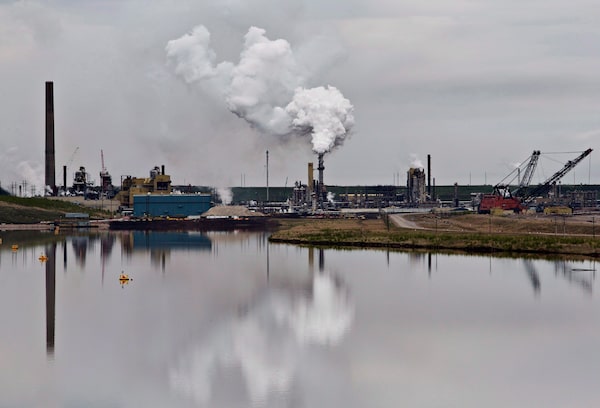
An oil sands extraction facility is reflected in a tailings pond near the city of Fort McMurray, Alta., on June 1, 2014.JASON FRANSON/The Canadian Press
When the story of Canada in the 21st century is written, there will be a sizable section reserved for Alberta. No other province in the country has been quite as gutted by the vagaries of the world marketplace and other unforeseen calamities, economic and otherwise.
The degree to which the global pandemic has taken a toll on the province was on full display this week. On Thursday, Finance Minister Travis Toews unveiled an economic update that Albertans had been previously warned would be grim – and he did not disappoint.
The government is now projecting a deficit for the current fiscal year of $24.2-billion, the largest in the province’s history. That is $7-billion more than previously forecast. Total projected accumulated debt over the current budget cycle will reach $100-billion. And there is every expectation it could exceed that number.
To no surprise, one of the principal reasons for the collapse is the price of oil. Revenues from Alberta’s golden goose – the oil sands – is now projected to be just $686-million. That is down from the $3.2-billion originally forecast when the budget for 2020-21 was unveiled earlier this year.
Oil and gas is now projected to account for just $1.2-billion of all revenues. That is about one-tenth of what it was almost a decade ago.
It feels like finance ministers in the province have been holding news conferences that convey this type of bleak news for years now. In June, 2014, oil was trading at a now-unimaginable US$107 a barrel; one year later, the price plunged to around US$42. It has gone up and down in the intervening years, but the market has never returned to its halcyon days and is not expected to.
And yet, when you listen to the province’s political leaders, the future remains oil and gas, even though their counterparts in Ottawa have declared that any post-COVID-19 restart of the economy has to prioritize the safety of the environment and the reduction of greenhouse-gas emissions.
In fact, no political leader in Alberta even dares suggest a world in which oil and gas are not the primary drivers of the economy. That would be blasphemy. So instead, we hear lots of talk about removing tanker bans so that maybe another pipeline can be built to the west, and about killing Bill C-69 so maybe one can be built to the east.
I haven’t read anywhere that oil prices are expected to return to levels previously witnessed. But I have read plenty about the world’s reliance on oil continuing to decline. Maybe Alberta Premier Jason Kenney knows something the rest of us don’t. For Alberta’s sake, I hope so.
As revenues shrivel up in the province, there is still no sales tax, there is still the lowest corporate tax rate in the country, and there are still the lowest income taxes anywhere. That’s wonderful if you live there, and wonderful when oil and gas revenues can cover the cost of those tax breaks. But it’s not so great when the bottom falls out of the sector that the province had relied on to underwrite the costs of these expensive amenities.
Fortunately, the situation in Alberta is not hopelessly dire. Its debt as a percentage of gross domestic product will still be comparatively low at the conclusion of this fiscal year – 22.3 per cent. That compares well to B.C.’s projected debt-to-GDP of 22 per cent and Saskatchewan’s of 20.8 per cent. Those are healthy numbers, although for many older Albertans the idea of being $100-billion in debt must be shocking.
Mr. Kenney’s government likes to pretend that things were on the upswing before COVID-19 came along and wrecked everything. If only that were true. The fact is, even before the pandemic hit, payroll jobs had been trending downward. Between August, 2019 and February, 2020 – that is, before the pandemic came knocking – roughly 24,400 jobs went missing.
Mr. Toews has promised to unveil a plan later this year for what a postpandemic world might look like in Alberta, and what a road map to such a recovery would require. I’m sure we’ll hear lots about an oil-and-gas rebound in the efforts around that road map, and not much about reducing reliance on those same sectors to fund government, with all the annual, roller-coaster thrills and chills that entails.
COVID-19 has unquestionably made things tough in Alberta. But they were bad before the plague arrived, and they won’t instantly be better after it leaves, either.
Keep your Opinions sharp and informed. Get the Opinion newsletter. Sign up today.
 Gary Mason
Gary Mason